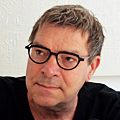Componist: Pierre Couprie
Pierre Couprie and his music.
Pierre Couprie is a researcher specialized in the analysis of 20th and 21st centuries music, digital musicology, and the relationship between music and technology. He is Professor of Musicology and Director of the Music and Performing Arts Department at the University of Evry Paris-Saclay.
He is a member of the Association francophone d’informatique musicale (Afim) and of the organizing committee of the Electroacoustic Music Studies Network (EMS). Since 2004, he has been collaborating with the Music, Technology and Innovation – Institute for Sonic Creativity (MTI2) at De Montfort University in Leicester on historical referencing and computer development projects in the field of electroacoustic music studies. In 2015, he was awarded the Qwartz Max Mathews Award for Technological Innovation for his software to assist in musical analysis (iAnalysis and EAnalysis).
Musician and composer of instrumental and electroacoustic music, he studied at the conservatoires of Bordeaux, Boulogne-Billancourt, Orsay and during composition courses in Darmstadt. Since the end of the 1990s, he has been practicing free electroacoustic improvisation.
http://www.pierrecouprie.fr
1/ Trio.
Part I. 04:10.
Part II. 03:57.
Part III. 03:42.
Three excerpts. (2020, Paris)
The Trio is the recent project of a young ensemble of improvised and spatialized electroacoustic music on acousmonium. It is made up of three members, musicians, researchers, musicologists and sound engineers. Each of the members of the Trio has a long experience of the stage and this new configuration allows us to come together in an innovative experiment.
2/ Les Phonogénistes. 09:53.
Improvised electroacoustic music.
Laurence Bouckaert, Pierre Couprie, Francis Larvor.
Saros. (2011, Paris)
Les Phonogénistes have improvised electro-acoustic music for nearly fifteen years and often with other forms of artistic expression sharing the same freedom. Vertiges de l’Image gather recordings of improvised music sessions taking place before concerts that have inspired the movies by Antonio de Sousa Dias. On stage, each member experiences independence in developing interactive links between music and image.
3/ On the Road. 18:25.
In 2003 lour departed Jacques Perdereau, technician at Radio Libertaire but above all a tireless hunter of sounds and music. Like his life, his taste was very eclectic but always turned towards the experimental, the unheard of, the extraordinary.
2004 was for Pierre the year of the discovery of his immense collection of recordings on the most diverse media (cassettes, magnetic tapes, vinyl, CD, MD, DAT). The recordings were also very diverse: concerts, radio broadcasts, montages, the famous endless tapes, sound effects, interviews, etc. The idea gradually germinated to pay homage to him through his recordings.
Thus was born On the Road from the tapes (about forty) recorded on his Nagra. On the Road mixes sounds, atmospheres, music he recorded between 1981 and 1997 with personal sounds recorded in 2006. It’s a journey from Belleville to Strasbourg, from intimacy to revolt, from the atmosphere of a street to that of a concert…
4/ A close encounter. (excerpt) 18:18.
Improvised electroacoustic music.
Mari Kimura, Pierre Couprie, Gyorgy Kurtag Jr, Hugues Genevois
A Close Encounter of the Seventh Kind (2019, Athens Improtech Festival)
Mari Kimura: violin / MUGIC™ sensor.
Pierre Couprie: Live Electronics.
György Kurtág: Handsonic.
Hugues Genevois: Koncertdoboz.
In musicology, a close encounter is an event in which a person witnesses an unidentified musical object. This terminology and the system of classification behind it were first suggested in cyber-musicologist Leonid S. Gonionski’s 1958 book The CE Experience: A Scientific Inquiry. Categories beyond Professor Gonionski’s original three have been added by others researchers and successors. It would be long and tedious to detail all these categories. Let’s just say that a close encounter of the seventh type occurs when the audience is invited to attend the creation of a musical hybridisation between real humans by scientific methods and technological means.
https://ikparisathina.ircam.fr/pages/concert-program-2.html









